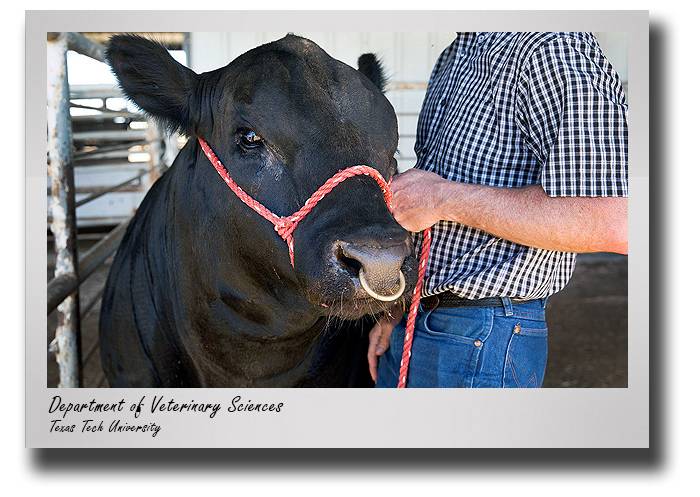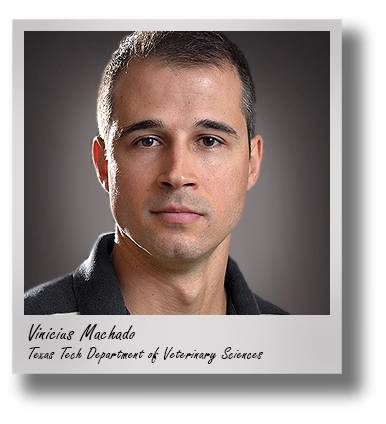CASNR experts team with Zoonotic & Infectious Diseases Research Center
By: Glenys Young
 In the midst of a global pandemic, Texas Tech University launched its new Zoonotic
and Infectious Diseases Research Center. While it might be easy to assume the coronavirus
was the reason behind the center's creation, that assumption would be inaccurate.
In the midst of a global pandemic, Texas Tech University launched its new Zoonotic
and Infectious Diseases Research Center. While it might be easy to assume the coronavirus
was the reason behind the center's creation, that assumption would be inaccurate.
"Before there was COVID-19, before there was a world health crisis that developed out of a zoonotic disease, we were already in dialogue with some of the research leaders across the campus about the possibility of focusing on this area," said Joseph Heppert, vice president of Texas Tech's Office of Research & Innovation.
 From the biology of zoonotic diseases in the environment to the impact they can have
on agricultural industries, Texas Tech's activities related to zoonotic disease have
been going on for 30 years or more. The Department of Natural Resources Management
in Tech's College of Agricultural Sciences and Natural Resources, specifically, has
dealt with Chronic Wasting Disease and Bluetongue, which threaten the Central Texas
hunting and ranching industries.
From the biology of zoonotic diseases in the environment to the impact they can have
on agricultural industries, Texas Tech's activities related to zoonotic disease have
been going on for 30 years or more. The Department of Natural Resources Management
in Tech's College of Agricultural Sciences and Natural Resources, specifically, has
dealt with Chronic Wasting Disease and Bluetongue, which threaten the Central Texas
hunting and ranching industries.
"Some of our field biologists have been studying the prevalence of various kinds of bacteria and viruses in different wild animal populations for decades," Heppert said. "In addition to the basic biological sciences, CASNR also has very strong emphases on beef cattle production and nutrition and the health of various kinds of domestic animals, not only beef, but also sheep, poultry and other kinds of animals as well."

Indeed, many researchers within Tech's College of Agricultural Sciences and Natural Resources are examining cattle health. Vinicius Machado, an assistant professor in the Department of Veterinary Sciences, is hoping to minimize antimicrobial resistance by improving targeted treatment using drugs.
Machado is examining the underlying factors associated with metritis, a bacterial infection that affects dairy cattle leading to reduced milk production and infertility. He is hoping to improve the judicious use of antimicrobial drugs by predicting spontaneous cure and treatment failure of metritis in dairy cattle, one of the more common diseases for which the drugs are used.

Meanwhile, Kristin Hales, the Thornton Distinguished Chair and associate professor in the Department of Animal and Food Sciences, is looking to mitigate antimicrobial resistance altogether. Hales was recently awarded a near-$1 million grant as part of a larger initiative from the USDA to mitigate antimicrobial resistance across the food chain.
Hales received the award from the USDA's National Institute of Food and Agriculture for her project, "Investigating the Emergence and Ecology of Antimicrobial Resistance in High-Risk Beef Cattle." The project will seek to identify how antimicrobial resistance develops and is spread in beef cattle, and develop mitigation strategies to reduce antimicrobial resistance incidents throughout the beef industry.
With so much longstanding expertise already on one campus, Heppert said, it only made sense to bring those experts together and start a bigger conversation. "The leaders I brought together were all from these different areas in agriculture and natural resources, from basic biology, field biological sciences and ecology, from areas like infectious diseases and engineering, where people are looking at ways to develop new kinds of systems that can mitigate or eliminate threats from some of these diseases," he said.
The key to a successful initiative is not trying to create an agenda from the top, but starting from the expertise already available and building upon that.
"With Texas Tech starting the brand new School of Veterinary Medicine; with the opportunity to build faculty research interests in the area of zoonotic infectious disease; with the interests we have on our campus, both in terms of field interest and also vaccine development; and with the interests and real expertise we have at the Texas Tech University Health Sciences Center in vaccine development, we have a tremendous potential to grow a world-class research facility at Texas Tech in this area," Heppert said.
CONTACT: William Brown, Dean, College of Agricultural Sciences and Natural Resources, Texas Tech University at (806) 742-2808 or william.f.brown@ttu.edu
0611NM20 / For the full text version of Glenys Young's Texas Tech University Office of Communications & Marketing news article, please click here
Editor's Note: A new online, video-orientated Red Raider Orientation is now available for our Fall 2020 incoming students. The microsite features a 'Meet the Deans' introduction, six CASNR department videos, three 'How To' videos, four 'Helpful Links' and a FAQ section.
Davis College NewsCenter
-
Address
P.O. Box 42123, Lubbock, Texas 79409-2123, Dean's Office Location:Goddard Building, Room 108 -
Phone
(806)742-2808 -
Email
kris.allen@ttu.edu
